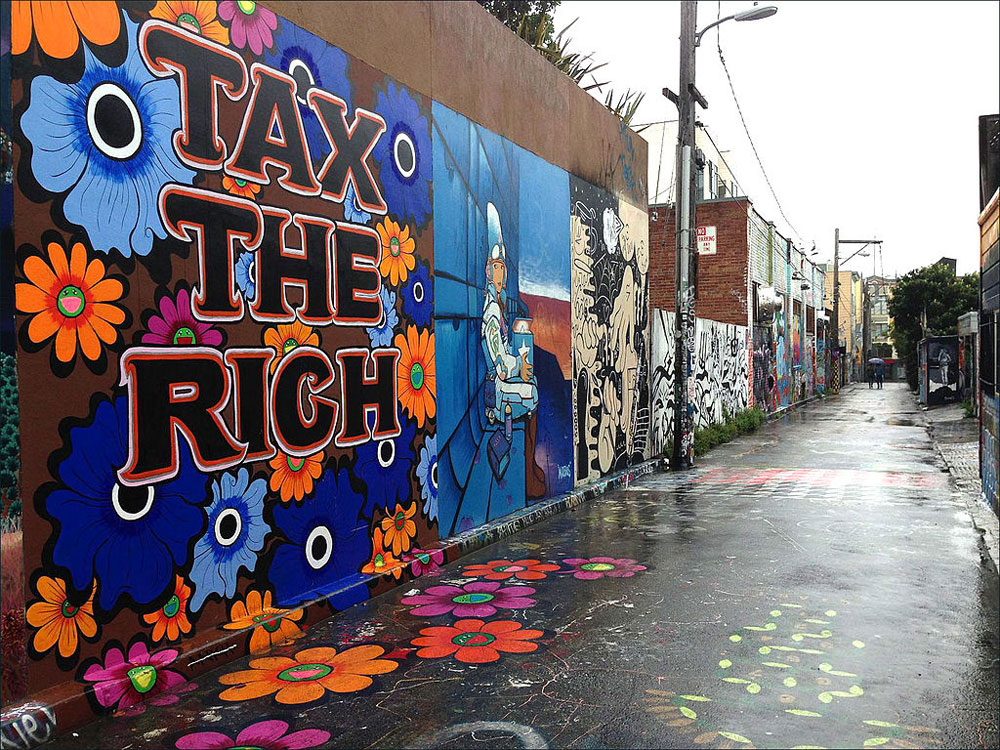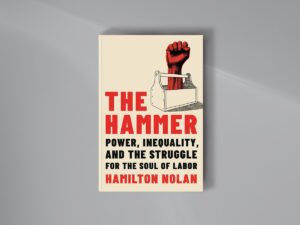
January 10, 2020; The Nation and Reuters
We know we a living in a prolonged period of growing wealth inequality that has left a small slice of the population fabulously wealthy while many more live paycheck to paycheck. As Steve Dubb poignantly summarized last summer, “A single person in the top one percent has the wealth of more than 1,250 people in the bottom 50 percent.”
The current approach to taxation, while often described as progressive, doesn’t always work out that way. For Americans with the highest incomes, total tax rates actually go down as their income rises. Economist Gabriel Zucman, in a recent interview with Clio Chang for the Nation, described this reality.
All income groups pay around 28 percent of their income in taxes. The working class basically pays less at around 25 percent, the middle class pays more at around 28 percent, and the upper middle class a bit more but without much variation, except at the very, very top. When you look at billionaires, or at the top 400 richest Americans, for them, the tax rate falls to 23 percent, so they have a lower tax rate than all other income groups.
In short, Zucman says, “The tax system, with everything included, looks like a giant flat tax that becomes regressive at the very top.”
Making the current situation even worse, income is currently taxed, but wealth is not. With wealth extremely concentrated among a small percentage of the nation’s population, this creates a self-perpetuating loop wherein great wealth generates more wealth. Economist Zucman used Warren Buffett as an example. “He’s worth $80 billion today, and his true economic income is something like six percent of his wealth, so around $5 billion, but because he instructs his company Berkshire Hathaway not to pay dividends, his taxable income is very low. Basically, what Buffett and other people in his position do is…he sells a few shares every year, realizes gains on those shares, $10 million or $20 million, and then pays a little bit of taxes on that.”
Sign up for our free newsletters
Subscribe to NPQ's newsletters to have our top stories delivered directly to your inbox.
By signing up, you agree to our privacy policy and terms of use, and to receive messages from NPQ and our partners.
When asked, Americans see inequality as a problem and want things to change. Poll after poll shows popular support for policies, even those described as politically risky, that would close the wealth gap. Just last week, Reuters reported on the results of a survey which showed how strong the desire for change is: 64 percent of respondents across income, race, and gender lines agreed somewhat or strongly with the idea that “the very rich should contribute an extra share of their total wealth each year to support public programs—the essence of a wealth tax.” When asked whether “the very rich should be allowed to keep the money they have, even if that means increasing inequality,” a slight majority disagreed.
Even some of the wealthiest citizens, those who would pay more taxes if the system was adjusted, have come out in support of change, writing in an open letter, “It is our duty to step up and support a wealth tax that taxes us. It is a key to both addressing our climate crisis, and a more competitive, stronger economy that would better serve millions of Americans. It would make America healthier. It is a fair way of creating opportunity. And it strengthens American freedom and democracy.”
It’s not that we don’t know how to reduce wealth inequality. Economists and several Democratic presidential candidates have put forward specific proposals designed to move toward a time when wealth is more equally distributed. Even the current system would be better if tax compliance were properly enforced. Zucman noted that wealthy individuals, supported by a cadre of tax avoidance advisors, have not been charged when they shielded income using impermissible transactions. “These transactions have the sole purpose of avoiding taxes. Therefore, they are illegal,” Zucman says. But to enforce these laws requires “more political will to do so,” Zucman observes.
Despite broad support for change, policymakers seem frozen. Perhaps they wish to encourage growing inequality. Maybe they fear that despite polling numbers, political advertisements from those who oppose change could shift those numbers so rapidly that they would lose, not gain, votes if they were to challenge elite wealth. Right now, though, as Celinda Lake, a Democratic pollster who has tested various wealth tax proposals, recently told the New York Times, “In terms of progressive policy, one of the big things we’re finding is it’s not opposition we’re fighting, it’s cynicism. People don’t think it can happen.”
People or politicians? When even Kathy Herron, 56, a Republican who strongly supports President Trump’s policies, tells Reuters, “We’re taxed from one end to the other, and it just seems the rich don’t pay their share,” change may be more possible than it is commonly thought. We may argue where funds should be spent, but there seems to be a growing consensus that the current system isn’t fair.—Martin Levine













